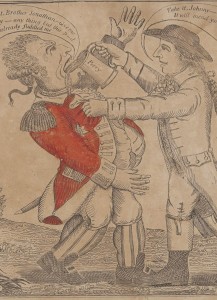 Politics, war, taxes, and trade agreements all affected the types and quantities of wines being imported. In England and the colonies, wines from France, Spain, and Portugal all fell in and out of favor depending on who was in power and what trade embargoes were in place.
Politics, war, taxes, and trade agreements all affected the types and quantities of wines being imported. In England and the colonies, wines from France, Spain, and Portugal all fell in and out of favor depending on who was in power and what trade embargoes were in place.
International agreements also affected supplies of wine-related objects and, to some extent, the decoration found on them. During the colonial period, political references—including portrayals of British monarchs—were consistently popular. Following the American Revolution, patriotic motifs and inscriptions referring to war heroes and important politicians, especially George Washington, were evident, and elaborate sequences of toasts commonly accompanied celebrations of elections, political reforms, and victories in battles. Depending on the period, particular sequences of dining and wining were appropriate. Catherine Mitchell, the wife of a senator in Washington wrote to her sister in New York (December 18, 1808),
I dined with [Mrs. Madison, wife of the President] a few days ago. There was a large party of congressional Ladies & Gentlemen . . . We had an excellent dinner serv’d up on superb french china, and plenty of good Champaign Wine to taper off with; for you know this is always drunk last of all, and is called ladies wine.
Wine was also shared among those who might be commiserating about unhappy changes in government policy. Just as today, tax increases were particularly irksome and formed the basis for everything from literary publications to satirical prints to inscriptions on punch bowls.
Related Themes:
